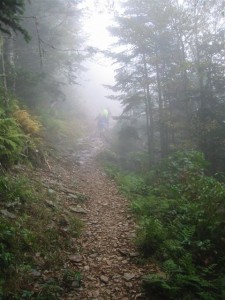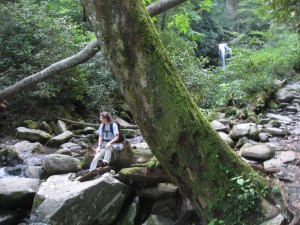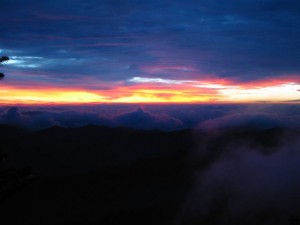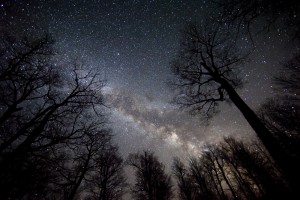It's easy to forget what legs are for,
what sinew and muscle and bone are for
until yours grow molten
and every fiber in them speaks to you,
until 'up' becomes the biggest word in the English language.
It's easy to forget the life force of a hundred millions tons of rock,
when after all- it's just been sitting there for the last epoch or so-
until you have the time to notice how it's skin changes
from sandy feet to its bald, granite head.
It's hard to know what wet really feels like until
you wander for hours
inside a cloud:
wear it, breathe it in, feel it slip between your toes,
and expell it again through your own pores.
It's easy to forget, as we sit, locked up tight
in our offices and living rooms, encased in our car-cocoons,
what the world is supposed to smell like:
damp, and stone, grass, and bone, tang of fir and cedar height,
musk of death, and flash of life.
We seal our doors and windows tight wear chemical masks of simulated reality.
We log and mine, drill and frack our wild places
and then name air fresheners after them.
As we pace within the lines we draw for ourselves,
set our fence posts and rake our lives into tidy rows
we forget the splendor of disorder,
the true peace of letting go.
It's easy to forget what the earth actually sounds like 
when all we know is the argument of traffic,
shriek of synthetic televised laughter,
click of locking doors, humming pump of artificial air.
It's easy not to recall the chuckle of stream over rocks,
piping of the Carolina wren from across the hollow,
the scrape of a footstep through leaf litter,
cathedral silence of the hemlock giants.
We forget about the sound of the wind
telling the secrets of its journey to the patient trees,
so that on winter nights they might dream of far-away places.
We forget, in our blinking digital age, staring at LCD images of water and sky
what light is supposed to look like-
forget the way it slants through branches in the early morning,
illuminates each fold and undulation of the mountains at dusk,
the infinite varieties of purple it paints on the underside of an evening thunderhead
or the way it glitters off restless water like God tossing a thousand flashing coins down to earth.
It's impossible to know what dawn really means until you stand above everything else 
so there's nothing but you and the sky and the edge of the world
and watch the sun come up, and wonder how it is
you ever slept through such ear-splitting beauty.
It's impossible to know how many colors there are until you stand on the mountain
and watch a thousand of them thicken and drip and fold in on themselves
as the sun goes down.
It's easy to forget you even have a heart
until the perfection of a single drop of water
tears yours from your body and offers it, laughing, to the four winds.
The gift of the mountain is a new understanding of these old things,
a re-acquaintance with the primal force of your own pulse,
a remembering what life is supposed to be.
Because it's esy to think that mankind is the master of our universe
after all we go Roving on Mars, baby!
but we are masters of our own little stinking caves, nothing more.
It's easy to forget, from the bowels of cities where the lights never go out
and the sky is a pale, silent thing
what the universe really feels like-
what it means to throw your head back and hear the roar
of a carpet of stars and galaxies both black and bright,
so massive it could crush you,
so vast you could just spread your arms and float away.





 Tracy Meisky is a poet, writer, singer, songwriter and all-around boat rocker from way back. Feel free to look around, but if you break it, you bought it.
Tracy Meisky is a poet, writer, singer, songwriter and all-around boat rocker from way back. Feel free to look around, but if you break it, you bought it.